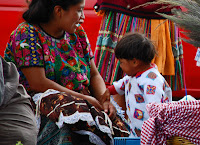 I was exploring the online GRE sample tests recently, and ironically one of the reading comprehension passages was all about photography. It aptly described the dilemma I face here (and I suppose that all photographers encounter)- the dilemma of objectivity and subjectivity. I find myself wanting to wear a big sign around that proclaims “I am not just some tourist… I take pictures of everything and everyone in my own home town!” I know that would not change the common assumption held especially by the indigenous women here that tourists are making money off of the pictures they take, and the more ancient belief that pictures capture part of the soul. So I have to attempt to be discrete with my enormous Nikon when and if I decide to use it. I want to capture the beauty, the lifestyle, the patient and diligent labor, the rich culture... but not at the expense of offending or damaging.
I was exploring the online GRE sample tests recently, and ironically one of the reading comprehension passages was all about photography. It aptly described the dilemma I face here (and I suppose that all photographers encounter)- the dilemma of objectivity and subjectivity. I find myself wanting to wear a big sign around that proclaims “I am not just some tourist… I take pictures of everything and everyone in my own home town!” I know that would not change the common assumption held especially by the indigenous women here that tourists are making money off of the pictures they take, and the more ancient belief that pictures capture part of the soul. So I have to attempt to be discrete with my enormous Nikon when and if I decide to use it. I want to capture the beauty, the lifestyle, the patient and diligent labor, the rich culture... but not at the expense of offending or damaging. 


The passage says, “Picture-taking is a technique both for annexing the objective work and for expressing the singular self. Photographs depict objective realities that already exist, though only the camera can disclose them. And they depict an individual photographer's temperament, discovering itself through the camera's cropping of reality. That is, photography has two antithetical ideals: in the first, photography is about the world, and the photographer is a mere observer who counts for little; but in the second, photography is the instrument of intrepid, questing subjectivity and the photographer is all.”



The author goes on to say, “These conflicting ideals arise from a fundamental uneasiness on the part of both photographers and viewers of photographs toward the aggressive component in "taking" a picture. Accordingly, the ideal of a photographer as observer is attractive because it implicitly denies that picture-taking is an aggressive act. The issue, of course, is not so clear-cut. What photographers do can not be characterized as simply predatory or as simply, and essentially, benevolent.”




No comments:
Post a Comment